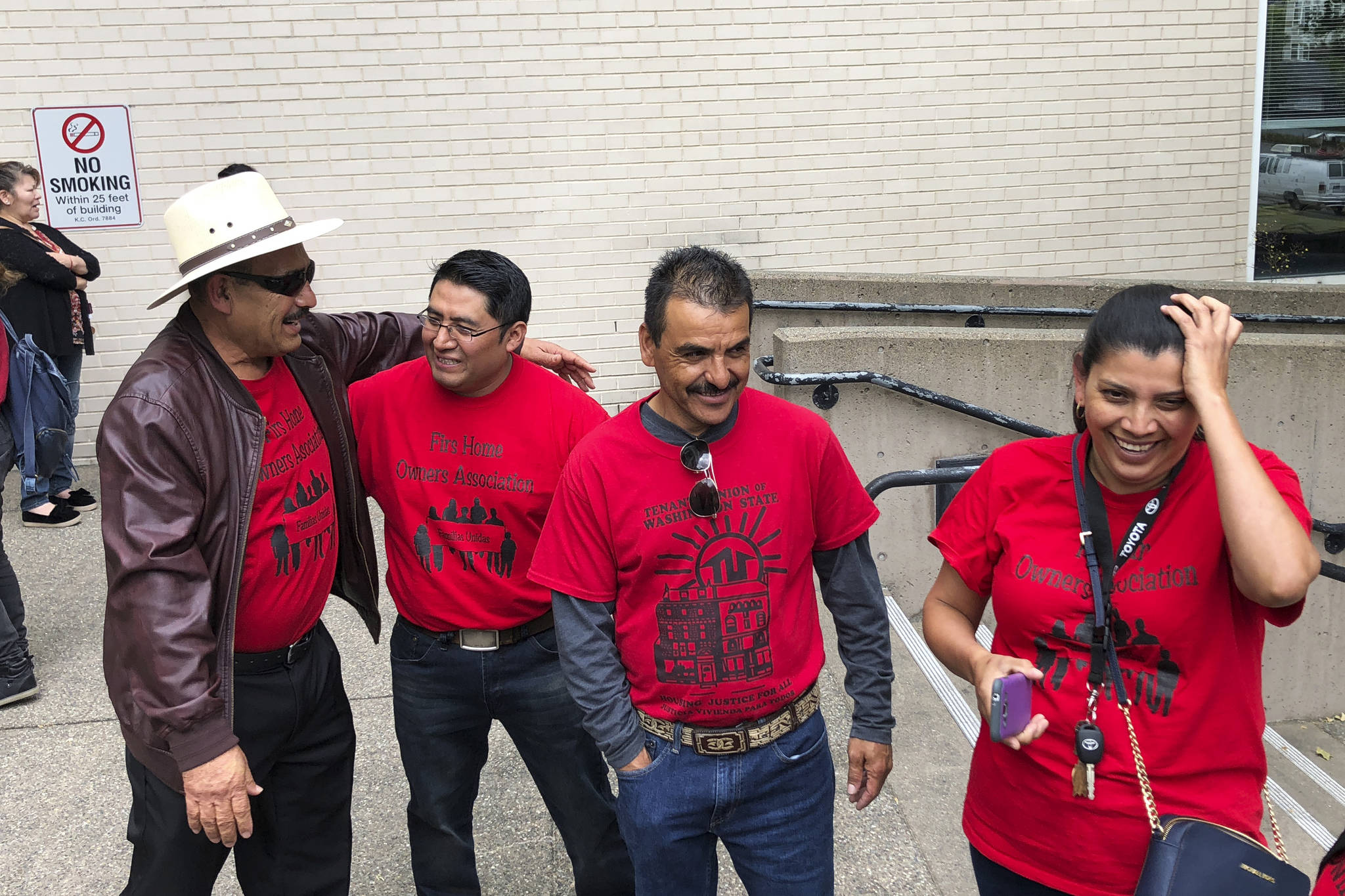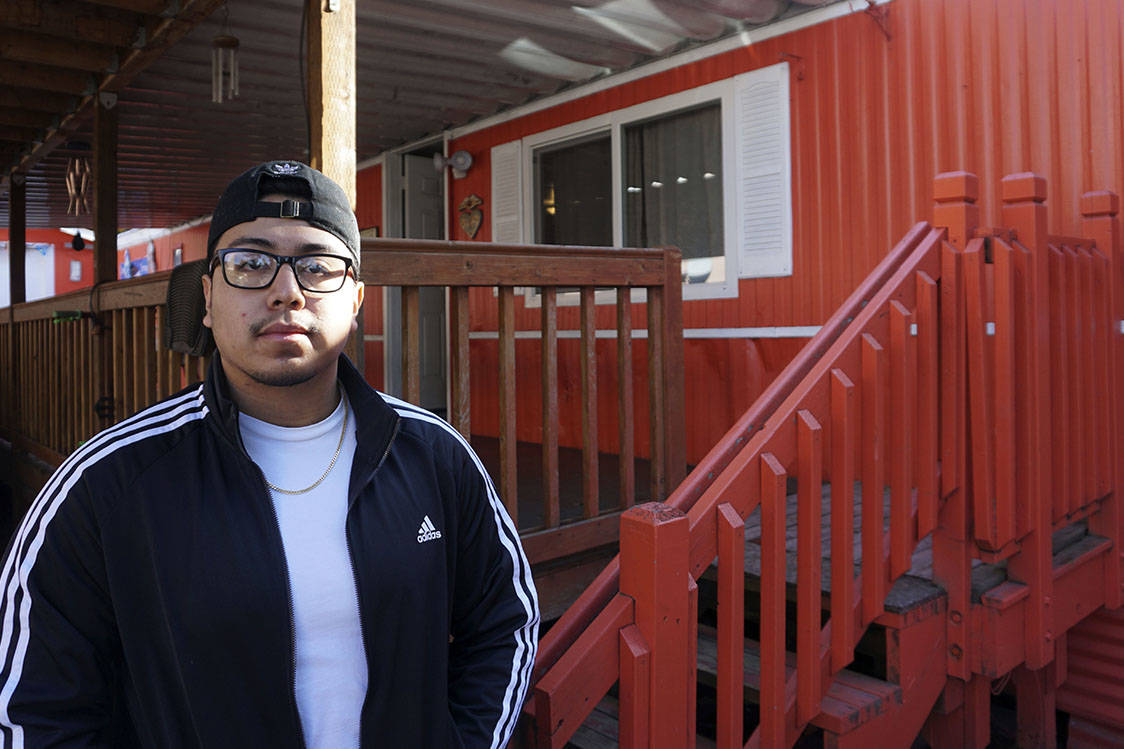“Si, se puede! (‘Yes, you can!’),” Firs Homeowners Association president Cruz Medina said as he faced his neighbors with an upraised first. The group huddled outside of the King County Maleng Regional Justice Center in Kent on Thursday afternoon to celebrate a minor victory in the Firs Mobile Home Park residents’ nearly two-year fight to remain at the park. Shortly beforehand, King County Superior Court Judge LeRoy McCullough delivered an oral ruling overturning the SeaTac hearing examiner’s February 2017 approval of the plan to close the park, thereby allowing about 200 residents to stay in their homes for now.
The saga began in May 2016, when Firs Mobile Home Park owner Jong Park started the process of closing the facility to make way for a hotel and apartment complex on the property. Park contends that he can’t continue to maintain the complex, while the homeowners argue that the tight-knit community would be severed if they’re forced to move. Although they continue to lease the land on which their homes sit, most of the residents have purchased their mobile homes in full, and say they could not afford to live anywhere else. So Medina and the other mostly Latinx residents formed the Firs Homeowners Association in October 2016, and promptly filed an appeal against the city’s decision to approve the relocation plan.
During Thursday’s hearing, McCullough ruled that Firs Mobile Home Park owner Jong Park and SeaTac violated some of the city’s requirements for closing a mobile home park by providing at least one year proper notice of intent to close the park, and the implementation of a plan to successfully relocate the over 60 households. “This court concludes that the petitioners have shown that approval of the plan was not supported by substantial evidence,” McCullough announced to the full court room.
Park and SeaTac were required to complete an inventory on residents’ income, among other things, but McCullough found “missing or incomplete data” in the forms resulted in a land use decision which he called “a clearly erroneous application of the law.” He acknowledged that “errors were compounded by language issues,” thus encouraging Spanish interpretation for the remainder of the relocation plan process. The order triggers a significant revision to the relocation plan, requiring that the city’s Community and Economic Development department re-collect all of the tenants’ demographics within 30 days. Park then must send the department the newly gathered information in a relocation plan appendix, which the city would either approve or deny.
Dressed in red shirts that bore the words “Firs Homeowners Association,” the residents milled about outside of the courthouse after Thursday’s ruling. “It was very positive what happened today for everybody,” Medina said in Spanish through translation provided by another homeowner.
The group’s next step is attempting to buy the land, which Medina believes is within their grasp, following the state’s allocation of a $2.5 million grant for the residents to buy the property. But a lack of additional funds stands between the residents and their dream of acquiring the property. The homeowners need another about $8 million to match the land’s property value, and then would have to convince Park to sell them the property. Park has repeatedly ignored the homeowners’ requests to negotiate, according to Medina. In a January interview with Seattle Weekly, Park said that he wouldn’t consider the association’s proposal to buy the property, “because they can’t afford it.”
“We have a meeting with a small bank, and they say they will support us,” Medina said, remaining hopeful. SeaTac municipal code stipulates that all residents of a mobile home park must move out prior to closure, so Thursday’s ruling grants the homeowners more time to figure out a plan.
Park offered the residents $2,000 in relocation assistance, and Washington state also offers reimbursements to low-income residents for relocation costs of up to $7,500 for a single-section and up to $12,000 for a multi-section home. However, the residents have deferred the offers because they say that they’re unable to transfer their mobile homes to another location. The residents argue that the manufactured homes wouldn’t pass state code for older trailers to be relocated, and risk falling apart if moved.
In Park’s eyes, the situation is more complicated than the homeowners perceive. “The park is very old and it will need more capital every year to maintain it. I hope the tenants understand there are many issues to consider,” Park wrote in an email to Seattle Weekly on Friday. “I do not know the laws very well, so I follow the advise which our attorney give me. I respect the judge and I just follow the court order.”
In the meantime, Firs resident Francesco Rodriguez said that he continues to feel like he’s in a limbo, despite Thursday’s ruling in their favor. “It’s not done yet. We gonna be more happy when we win—our goal is to buy the property,” Rodriguez said. He’s reluctant to search for another home, because he has invested $15,000 into renovating and maintaining his trailer since he purchased it for $29,000 over a decade ago. More than anything, he’s committed to maintaining the sense of community that he and his neighbors have forged throughout the years. “We all look [out] for each other.”
mhellmann@seattleweekly.com









